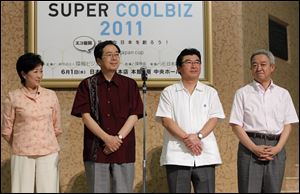
Japan's office casual going Super Cool
6/3/2011
Former environment ministers, from left, Yuriko Koike, Tetsuo Saito, and Sakihito Ozawa join current Environment Minister Ryu Matsumoto, right, at a Super Cool Biz fashion show in Tokyo. With Japan limiting air conditioning, the government is encouraging light, airy, and casual attire for the office.
TOKYO -- The Japanese government wants the country's suit-loving office workers to be bold this summer. Ditch the stuffy jacket and tie. And for the good of a country facing a power crunch, go light and casual.
Japan's "Super Cool Biz" campaign kicked off this week with a government-sponsored fashion show featuring outfits appropriate for the office yet cool enough to endure the sweltering heat.
This summer may be especially brutal. The loss of the Fukushima Daiichi nuclear power plant, which was crippled by the March 11 earthquake and tsunami, means electricity could be in short supply around the nation's capital, Tokyo, during especially hot days.
To prevent blackouts, the government is asking companies and government offices to cut electricity usage by 15 percent. It wants companies to limit air conditioning and set room temperatures at 82 degrees Fahrenheit.
The idea isn't new.
"Cool Biz" was introduced in 2005 by the environment minister at the time, Yuriko Koike. The campaign was part of efforts to fight global warming.
But with Japan dealing with a nuclear crisis and the aftermath of a magnitude-9.0 earthquake and tsunami, officials decided they needed to take Cool Biz one step further.
"When we started Cool Biz in 2005, people said it was undignified and sloppy," Mr. Koike said at the fashion show at a Tokyo department store. "But this is now the sixth year, and people have grown accustomed to it."
Surveys by the Cabinet Office indicate that companies gradually are jumping on board. In a 2009 nationwide poll, 57 percent of about 2,000 respondents reported that Cool Biz had been implemented in their workplaces. The figure stood at 47 percent two years earlier and at less than a third in 2005.
So what's different with Super Cool Biz?
First, the dress code. Polo shirts, Aloha shirts, and sneakers are acceptable now under the environment ministry's relaxed guidelines. Jeans and sandals are OK too under certain circumstances.
Men might even think of carrying a fan or trying a pair of tight pedal pushers like one model wore, though whether such fashion extremes would actually catch on is another matter.
Notably missing from the environment ministry's dress code are specific rules for women.
Khakis, white pants, and airy polyester dresses are all apparently acceptable.
For retailers selling casual clothes, Super Cool Biz could provide a much-needed boost after the disaster, which led consumers to cut back on spending.
Chains such as Fast Retailing's Uniqlo have stockpiled polo shirts and chinos in anticipation of strong demand.
Officials also hope to spur energy-saving creativity with the campaign, both in and out of the office. To deal with the heat, the ministry suggests using gel sheets or consuming foods that cool the body. It also encourages employees to limit overtime hours, consider working from home when appropriate, and take two weeks of summer vacation.